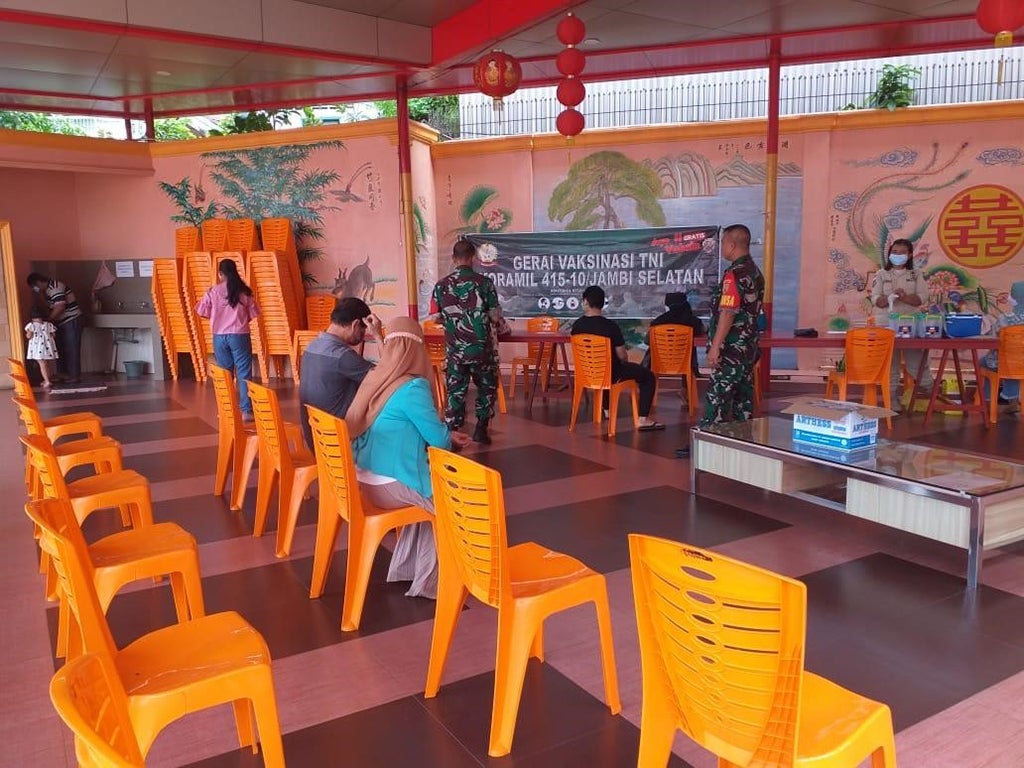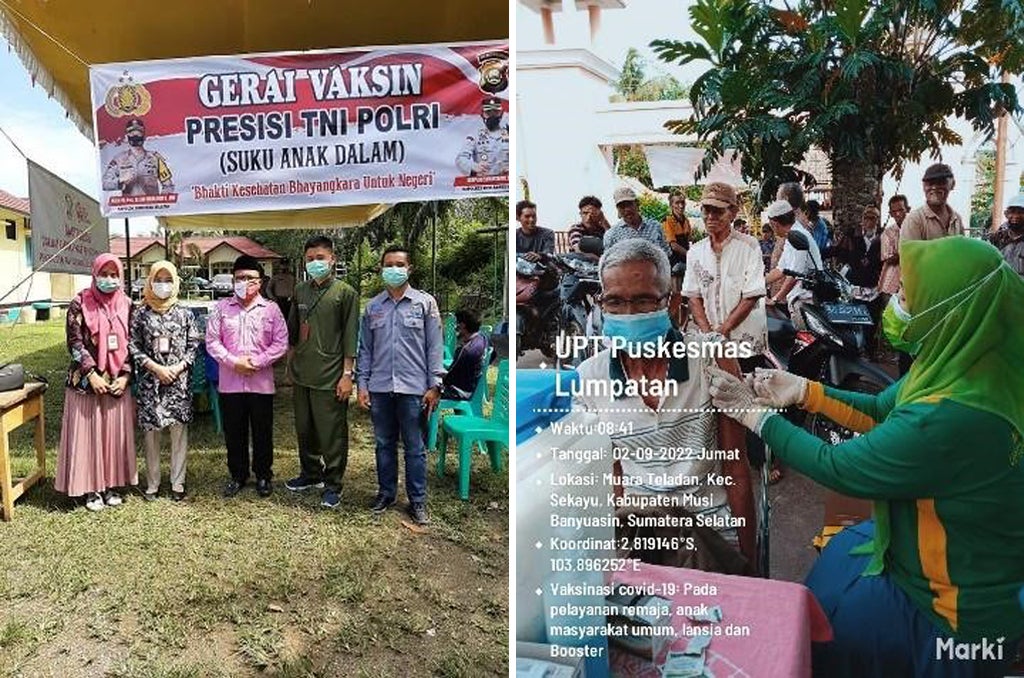From COVID-19 Vaccine Hesitancy to Vaccine Acceptance in South Sumatra, Indonesia
contributed by Najmah, Kusnan and Sharyn Graham Davies, 04 February 2023

Trying to administer COVID-19 vaccines to an archipelagic population of 280 million people spread over 6000 islands is no small task. The current high vaccine uptake rate is in stark contrast to early attempts at vaccination, where hesitancy was high even though COVID-19 vaccines were life-savings. In December 2020, the results of a phone survey of 1,202 respondents in 34 provinces in Indonesia suggested that about 70% of Indonesians knew about COVID-19 vaccination plans for targeted groups, and about 80% trusted the government to provide the vaccine. However, only 37% were sure they would accept vaccination when it was offered, 17% said they would not accept the vaccines, and 40% would need to think about whether to accept the .
In 2022, Indonesia reported high coverage of COVID-19 vaccines. As of 18 September 2022, Indonesia claimed it had administered the first dose of vaccines to 87% of its targeted population of 204 million. Further, 170 million (72%) citizens had received a second vaccine, and 62 million (26%) had received a third.
Vaccine acceptance, according to Noni E. MacDonald, is the norm in the majority of populations globally. A comparatively small percentage refuse some vaccines but accept others, and some delay vaccination before finally getting them. The conditions of vaccine acceptance depend on vaccine complacency (perceived risks of vaccine-preventable diseases), vaccination confidence (trust in effectiveness and safety of vaccines, trust in competencies of health professionals and policymakers), and vaccine convenience (physical availability, affordability, geographical accessibility, and cultural context). In Indonesia, what are the factors that increase vaccine acceptance.
The current high vaccine uptake rate is in stark contrast to early attempts at vaccination in Indonesia, where hesitancy was high. Our research explores the socio-economic, political, and religious factors that resulted in uptake of vaccines. To understand this phenomenon, we conducted thematic analyses of online news reviews related to COVID-19, social media postings by government sectors, feminist-participatory action research, and interviews with 40 women and 20 health workers and policymakers in South Sumatra, Indonesia.

GETTING THE VACCINE AS JIHAD (ISLAMIC REQUIREMENT)
The government wants to acknowledge the views of Indonesian people who reject the vaccine due to religious sentiments. To encourage the Islamic Ummah (community) to get the vaccine the government began to use Islamic war terms such "jihad", which was then very popularly quoted by the government on various occasions. Using the term jihad allowed the government to utilize the energy and sentiment of resistance on a religious basis.
Basara's hope is in line with the appeal of the General Chairperson of the Nahdlatul Ulama (PBNU) Executive Board, Prof. KH Said Aqil Siraj. "In the context of Indonesia and the world facing this pandemic, students must take a role in jihad and give their best contribution to help overcome the COVID-19 outbreak," said Aqil.
Source: detik.com
It is interesting that the term jihad became commonly used because the Joko Widodo government is against using words that incite violence, terrorism, and anti-diversity. The use of the term jihad was followed by local government, including the Governor of South Sumatra, Indonesia, who stated: "Vaccination in boarding school is one way for jihad to fight COVID-19."
Furthermore, we can also find that in this phase of vaccine acceptance, Islamic opposition parties such as the Prosperous Justice Party (Partai Keadilan Sejahtera) wanted to maintain their way in winning the hearts of the people. Therefore, the party also supported the national vaccination program through an official statement from the Shura Council. For them, the Shura Council is placed in the highest position in their Party structure as a representation of a modern Islamic Party.
INVOLVING THE INDONESIAN NATIONAL MILITARY (TNI) AND POLICE
|
We shared roles in gaining targets for COVID-19 vaccines. We, from the health district, are responsible for 60% of the total target, while Indonesian National Military is responsible for 20%, and the Indonesian Police is for 20%. What I am curious, to encourage the community to visit Covid-19 vaccines; they provide gifts, like rice, oil to coupons to win a bicycle or motorcycle (A policy maker in health district, Informal Interview, 2021) |
Some headline news also supported our observation. Some headlines mentioned President of Joko Widodo’s appreciation for his ministers and some governors from TNI and Polri: “Indonesian reaches the 4th the world of COVID-19 coverage, Jokowi appreciate TNI-Polri" and the Ministry of Finance mentions the importance of the Indonesian military and police in solving COVID-19," and the Ministry of Health appreciates the involvement of Indonesian military and police in COVID-19 vaccination.
“Therefore, I would like to take this opportunity to also thank all ranks of the TNI-Polri that in the currently extremely challenging atmosphere, the TNI-Polri institutions can be relied on to solve problems.” (Ministry of Finance, Indonesia, website)
Well, the problem in the province is that there are many aspects, because this is a political position,” said Budi. "So, we need a special route that can go directly from the central government, push it down, namely using the TNI-Polri, (Ministry of Health, Indonesia, Kompas).
The involvement of the military and police, and providing gifts may contribute to the increased accessibility of COVID-19 vaccines. First, the responsibility of meeting vaccine targets was shared by different parties. Indeed, police, military personnel, and local key leaders accompanied health workers in undertaking COVID-19 vaccination. Second, citizens were provided with rewards and punishments for accepting and rejecting vaccines. For instance, if we wanted COVID-19 vaccines, we could travel by plane and land transportation between regions. Small gifts like one or two liters of oil, 5 kilograms of rice, or the possibility of winning a motorcycle through lucky draws were also provided. Third, working with religious leaders and setting up vaccination camps in prayer centres led to an increased acceptance of vaccines.
Interestingly, TNI and Polri reach communities, from giving rewards for children and adults to the elderly who access COVID-19 vaccines to conducting COVID-19 vaccines in religious centres and praying, such as Mosques, churches and Buddhist temples, and Konghucu temples (klenteng). The cultural and religious approaches were conducted with national and local religious leaders to leaders of indigenous groups, such as Suku Anak Dalam in the Southern part of Sumatra.

Source: Najmah
LESSONS TO LEARN: FAITH IN IMMUNITY, RELIGION, COVID-19 VACCINES, AND STRUCTURES OF TRUST
Our study shows that religious belief in Indonesia enabled the government to successfully implement the national COVID vaccination program.
The success of the Indonesian government is due in part to it adopting religious concepts and language and working alongside religious communities. Furthermore, in Indonesia, where religion is not merely a ritual but is a significant part of culture , spirit, and the foundation of society, using religion to increase vaccination rates was an important step to take.
In a religious culture like Indonesian, policymakers need to include views of important figures, religious leaders and religious organizations that have a large followers. The opinions of the Vice President, who often represents the views of religious figures and respected clerics from Nahdatul Ulama, are important to consider as well. Further, it is useful to tap into the language and predominant religious sentiment to mobilize the Muslim community in one vision of "war" against the COVID-19 pandemic.
Disclaimer: The views and opinions expressed in this article are those of the authors and do not necessarily reflect the position of the blog editorial team or the Asia Research Institute.
South Asia | Southeast Asia | East Asia | Other Places | Hinduism | Buddhism | Islam | Christianity | Other Religions
Najmah is a lecturer in the Faculty of Public Health in Sriwijaya University, South Sumatra, Indonesia, and an adjunct research fellow at Monash University, Australia. Najmah graduated from Auckland University of Technology in 2020, and she was awarded the prestigious New Zealand Scholarship for her doctoral studies. Najmah also has degrees from the University of Melbourne, where she studied on an AusAID Partnership Scholarship. Her bachelor's degree is from Sriwijaya University, South Sumatra. Najmah's research interests are in HIV, women, and COVID-19.
Kusnan is a graduate from the School of Graduates and Professional Studies in Master of Science in Islamic Finance, INCEIF, Malaysia. He has presented a working paper at an international conference on in Islamic Economics and Finance. He is interested in various research fields, including Islamic finance, Islamic studies, shadow banking, politics, and humanities, and he is currently completing several papers to be published in journals.
Sharyn Graham Davies is the Director of the Herb Feith Indonesia Engagement Centre and Associate Professor in the School of Languages, Literatures, Cultures, and Linguistics at Monash University in Melbourne, Australia. She received her PhD from the University of Western Australia (Anthropology and Asian Studies). Prior to her appointment at Monash, she was at Auckland University of Technology (AUT) in New Zealand. Sharyn has held visiting fellowships at Cambridge, Yale, Sydney, Peking and Airlangga universities, and has been awarded Fulbright, Leverhulme, and Marsden funding. Sharyn is recognised internationally as an expert in Indonesian Studies and for her contributions to the study of gender, sexuality, policing, social media, and moral surveillance.

